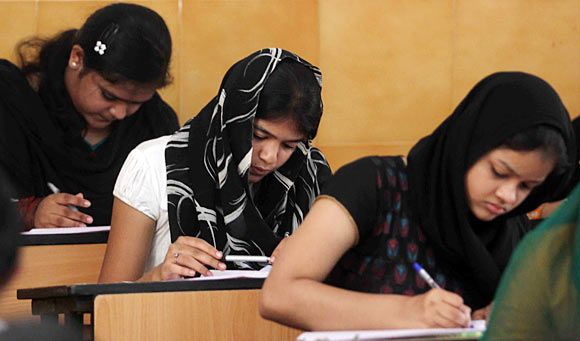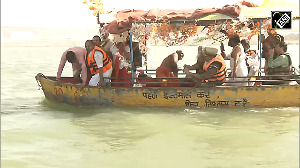Here's all you need to know about preparing for the Civil Services examination -- important books, scope of career and more.

Photograph: Sahil Salvi
The Civil Services Exam, popularly known as the IAS Exam is one of the most coveted and challenging examinations held in India.
Each year, lakhs of aspirants apply for the exam, but only the best minds make it to the final merit list.
The online application process for 2017 has begun online and will end on March 17.
This year there will be approximately 980 vacancies across the country.
If you are planning to take the exam this year, here are some key points to remember:
- Exam conducting Body: Union Public Service Examination (UPSC)
- Month of Examination: June (Prelims), October (Mains)
- Stages of the Exam: 3 (Preliminary examination + Mains examination + Interview)
- Level of Complexity: Difficult
Exam Pattern
The Civil Services examination is held once a year in two distinct stages – Preliminary examination (popularly known as prelims) and Mains examination (comprising of written papers and an interview).
Prelims
The written preliminary examination is scheduled for June 18, 2017. It consists of two objective type papers: General Studies Paper I and II.
- Paper I comprises syllabus pertaining to general awareness, is extremely vast in nature.
- Paper II features Aptitude and is only qualifying in nature. It is popularly known as CSAT (Civil Services Aptitude Test), although not an official term.
There is also negative marking for every incorrect answer attempted for both Paper I and II.
- Paper I (100 Questions, 200 marks)
- Paper II( 80 Questions, 200 marks)
Mains
The Main examination consists of 9 descriptive papers. In addition to the written papers, an interview will also be conducted of the candidates who clear the written examination.
Paper A: Any Indian language as enlisted by UPSC (300 marks, Qualifying in nature)
Paper B: English (300 marks, Qualifying in nature)
Paper – I: Essay (250 marks, Compulsory )
Paper – II: General Studies I (250 marks, Compulsory)
Paper – III: General Studies II (250 marks, Compulsory)
Paper –IV: General Studies III(250 marks, Compulsory)
Paper – V: General Studies IV(250 marks, Compulsory)
Paper – VI: Optional Paper 1 (250 marks, Compulsory)
Paper – VII: Optional Paper 2(250 marks, Compulsory)
Recommended Books for Civil Services
The fact that Civil Services include a hefty syllabus makes it confusing for aspirants to choose from the resources available.
Here's a comprehensive list of books that will help you prepare:
History
- Old NCERT book for Ancient India; Classes 11 and 12
- Nitin Singhania notes for Art and Culture
- NCERT book on Medieval India- Classes 11 and 12
- Modern India- Spectrums
- India Struggle for Independence – Bipin Chandra
- World History - Norman Lowe
Geography
- World Geography: NCERT books for Classes 6, 7, 8, 9, 10 and 11
- Indian Geography by Majjid Hussain
- Certificate Physical and Human Geography by GC Leong
- Oxford School Atlas
Polity
- NCERT books for classes 11 and 12
- Indian Polity by Laxmikanth
- Constitution of India by D D Basu
- Annual Reports – Sarkaria, Punchi, 2nd ARC (RTI, E-Governance, Social Capital)
Economy
- Indian Economy by Ramesh Singh
- Economic Survey Summary
- SRIRAM's IAS notes
Environment
- NCERT book for class 7
- Biology NCERT book class 12
- Chemistry NCERT book 12 Part 2
- ICSE books for Classes 8, 9, 10 books
- Shankar IAS Notes
- Down to Earth Magazine
General Science
- ICSE Books Classes 8, 9 and 10
- Science Reporter Magazine
- The Hindu's special feature on Science and Technology
Current Affairs
- The Hindu
- Yojana
- Kurukshetra
- India Year Book
Ethics
- Ethics, Integrity and Aptitude by Lexicon
Aptitude
- Analytical Reasoning by MK Pandey
- Quantitative Aptitude for Competitive Exams by Dr RS Aggrawal
- How to Prepare Verbal Ability and Reading Comprehension for CAT by Arun Sharma
- Proficiency in Reading Comprehension by Ajay Singh
Career Prospects
Any candidate who makes it to any of the 20+ services under Civil Services will live a life of affluence and respect.
Currently, the top three services under UPSC are Indian Administrative Service, Indian Foreign Service and Indian Police Service.
Besides fully furnished accommodation, the new recruits will also be provided with a vehicle, medical allowance, Internet allowance, fully paid trips around the nation and even fellowships to study abroad.
The sooner you clear the exam, the higher your chances to reach to the topmost positions on the hierarchical ladder.
The highest ranked positions under the three services are as follows –
- Indian Administrative Service (IAS) - Cabinet Secretary
- Indian Police Service (IPS) - Director, Intelligence Bureau
- Indian Foreign Service (IFS)- Foreign Secretary, India
How to Apply
Since the notification for 2017 has been issued recently, candidates are advised to apply as soon as possible in order to avoid any last minute confusion.
The procedure for applying is simple. Register on the official site www.upsc.gov.in and fill in 2 registration forms – I and 2.
Once the registration is done, you will receive a registration number on your e-mail and via SMS. Save it for all future references.
The last date to apply for Civil Services exam is March 17, 2017.
This article is written by Akriti Mattu of Sarkari Jobs, a Bengaluru based portal for discovering government/PSU Jobs. She has also been a successful ex aspirant who qualified the written exam (both stages) in her first attempt but chose a different stream professionally.











 © 2025
© 2025